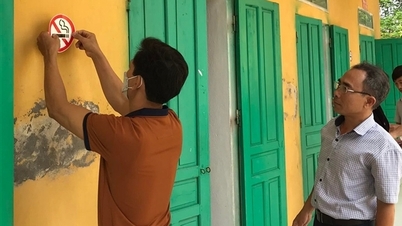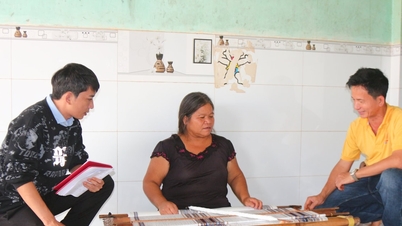Recently, Medlatec Go Vap General Clinic, Ho Chi Minh City received a female student with a dangerous autoimmune thyroid disease, requiring timely intervention and treatment. It is known that this disease can only be treated to maintain and prevent complications, there is no complete cure.
At the clinic, the doctor did not detect any abnormalities during clinical examination. The thyroid ultrasound results showed diffuse thyroid hyperplasia and signs of thyroiditis. The patient's test results showed that the thyroid function indexes were elevated beyond the allowable threshold, which is a typical sign of autoimmune thyroid disease.
Based on the examination results and typical signs of thyrotoxicosis syndrome (weight loss, restlessness, hand tremors, rapid heart rate) and thyroid morphological changes syndrome on ultrasound, the doctor concluded that the patient had Basedow's disease.
Explaining the disease, Dr. Nguyen Thi Phuong - Laboratory Specialist, Medlatec Go Vap General Clinic said: Basedow is a typical autoimmune disease of the thyroid gland. The disease cannot be completely cured but needs to be monitored and treated in stages, according to the individual progression of each patient.
Patients are advised to receive outpatient treatment and need to be closely monitored at each stage to prevent dangerous complications that may occur.
Basedow's disease is an autoimmune disease of the thyroid gland that occurs when an autoantibody called "TSH receptor antibody" (abbreviated as TRAb) appears. This receptor acts as a thyroid hormone that causes thyroid follicular cells to proliferate and increase thyroid hormone synthesis in an uncontrolled manner.
Symptoms of the disease include nervousness, palpitations, possibly a feeling of suffocation, pain in the precordial region, digestive disorders, rapid weight loss, bulging eyes, a palpable mass in the middle of the neck, with clear boundaries, painless, moving with swallowing...
If not closely monitored and treated properly, the disease can progress to serious complications including: Stroke; heart failure/heart problems; thinning of bones, leading to osteoporosis; thyroid storm (sudden increase in symptoms that seriously threatens life).
 |
| Myxedema is the least common manifestation of Graves' disease. |
In addition, Basedow's disease is a common cause of hyperthyroidism with characteristic manifestations including diffuse goiter, exophthalmos, and pretibial myxedema.
Doctor Nguyen Thi Phuong said, Basedow is an autoimmune disease, in which the mechanism of the disease is not really clear. However, the disease has a familial nature with about 15% of patients having relatives with the same disease, of which 50% of relatives of patients have circulating anti-thyroid antibodies.
Basedow's patients also face the risk of developing other autoimmune conditions such as rheumatoid arthritis, systemic lupus erythematosus, primary adrenal insufficiency, type 1 diabetes, vitiligo... These are all autoimmune diseases that cannot be completely cured but need to be monitored and treated in stages, according to the individual progression of each patient.
Most thyroid-related conditions can be treated to restore thyroid function to normal . However, patients will need to take medication regularly to control the condition.
Currently, antithyroid drugs, surgery, and radioactive iodine are highly effective treatments that can restore thyroid function. Radioactive iodine and surgery can treat hyperthyroidism by removing the thyroid gland.
In certain cases, antithyroid drugs can make thyroid-stimulating antibodies disappear, thereby improving the symptoms of Graves' disease and the patient can stop using the drug afterwards. However, these antibodies can return when there are favorable factors such as bacterial infection, viral infection, pregnancy, etc.
"In essence, Graves' disease cannot be completely cured. After being diagnosed with Graves' disease, all patients need lifelong medical monitoring to ensure that their thyroid gland is still functioning within its best range," Dr. Phuong shared.
Source: https://nhandan.vn/basedow-benh-ly-tu-mien-cua-tuyen-giap-pho-bien-o-nguoi-tre-nguy-hiem-the-nao-post854170.html




![[Photo] Prime Minister Pham Minh Chinh chaired a meeting of the Steering Committee on the arrangement of public service units under ministries, branches and localities.](https://vphoto.vietnam.vn/thumb/1200x675/vietnam/resource/IMAGE/2025/10/06/1759767137532_dsc-8743-jpg.webp)
![[Photo] Prime Minister Pham Minh Chinh chairs a meeting of the Government Standing Committee to remove obstacles for projects.](https://vphoto.vietnam.vn/thumb/1200x675/vietnam/resource/IMAGE/2025/10/06/1759768638313_dsc-9023-jpg.webp)






















































































Comment (0)